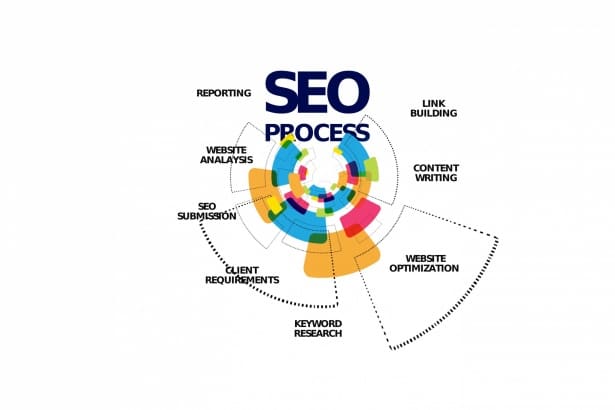What Is SEO / Search Engine Optimization?
SEO stands for “search engine optimization.” In simple terms, it means the process of improving your site to increase its visibility when people search for products or services related to your business in Google, Bing, and other search engines. The better visibility your pages have in search results, the more likely you are to garner attention and attract prospective and existing customers to your business.
How does SEO work?
Search engines such as Google and Bing use bots to crawl pages on the web, going from site to site, collecting information about those pages and putting them in an index. Think of the index like a giant library where a librarian can pull up a book (or a web page) to help you find exactly what you’re looking for at the time.
Next, algorithms analyze pages in the index, taking into account hundreds of ranking factors or signals, to determine the order pages should appear in the search results for a given query. In our library analogy, the librarian has read every single book in the library and can tell you exactly which one will have the answers to your questions.
Our SEO success factors can be considered proxies for aspects of the user experience. It’s how search bots estimate exactly how well a website or web page can give the searcher what they’re searching for.
Unlike paid search ads, you can’t pay search engines to get higher organic search rankings, which means SEO experts have to put in the work. That’s where we come in.
Our Periodic Table of SEO Factors organizes the factors into six main categories and weights each based on its overall importance to SEO. For example, content quality and keyword research are key factors of content optimization, and crawlability and speed are important site architecture factors.
The newly updated SEO Periodic Table also includes a list of Toxins that detract from SEO best practices. These are shortcuts or tricks that may have been sufficient to guarantee a high ranking back in the day when the engines’ methods were much less sophisticated. And, they might even work for a short time now — at least until you’re caught.
We’ve also got a brand new Niches section that deep-dives into the SEO success factors behind three key niches: Local SEO, News/Publishing, and Ecommerce SEO. While our overall SEO Periodic Table will help you with the best practices, knowing the nuances of SEO for each of these Niches can help you succeed in search results for your small business, recipe blog, and/or online store.
The search algorithms are designed to surface relevant, authoritative pages and provide users with an efficient search experience. Optimizing your site and content with these factors in mind can help your pages rank higher in the search results.
Why is SEO important for marketing?
SEO is a fundamental part of digital marketing because people conduct trillions of searches every year, often with commercial intent to find information about products and services. Search is often the primary source of digital traffic for brands and complements other marketing channels. Greater visibility and ranking higher in search results than your competition can have a material impact on your bottom line.
However, the search results have been evolving over the past few years to give users more direct answers and information that is more likely to keep users on the results page instead of driving them to other websites.
Also note, features like rich results and Knowledge Panels in the search results can increase visibility and provide users more information about your company directly in the results.
In sum, SEO is the foundation of a holistic marketing ecosystem. When you understand what your website users want, you can then implement that knowledge across your campaigns (paid and organic), across your website, across your social media properties, and more.
How Search Engines Work
The fundamental aim of search engines is to satisfy their users. They want to provide the best results when a user searches for something. When someone uses a search engine, such as Google, Bing, or Yahoo, they are looking for the solution to a problem or the answer to a question. These engines want to provide the most helpful, relevant, and credible answer or solution.
Keywords
In SEO, we often refer to ‘keywords’ — this is slightly misleading. ‘Search queries’ is a much better term. We are not looking at individual words; we are looking at combinations of words that express a problem or a question.
Note: even when a user searches with just one word, they are still expressing a problem or question — they are just not being very clear!
What Is Your Audience Searching For?
To work effectively on your SEO, you need to figure out what your potential customers are searching for. Find the phrases that they use to search, and then create content that brings a clear, simple, and helpful solution to the problem that the user expressed. Semrush offers a tool that allows you to find out based on your market and your competitors.
Google vs. the Rest of the Search Engines
Google dominates search in most countries across the globe, almost to the point of being a monopoly, particularly in English. In English, worldwide, 88% of searches on desktop are on Google. On mobile, that figure is a whopping 96%. Bing and Yahoo combined account for 1.5% of searches on mobile and 8% of searches on desktop. That makes Google vastly dominant. And by far, the most important search engine you should be focusing on.
How Google Works
Google says, “ we are organizing the content of the web.” That is a lovely way of putting it. Google organizes the content of the web to be able to deliver to its users the best answer to their question or solution to their problem. You can look at this as Google being a reference system for all the information on the web. It keeps references to every page (and the information it contains), and then when someone asks for specific information, Google can point them to the content that best supplies the answer or solution.
It is very helpful to approach SEO from the perspective that you are providing solutions to Google’s users, and you are asking it to recommend your solution.
Matching User Intent to Truly Useful Content
So here are two things Google needs to match. On one side, user intent: when someone searches on Google, they are expressing a problem they need a solution to. But they often express that problem incompletely or ambiguously. Google tries to understand what they mean. What is their intent? What is the specific problem they are trying to solve? Google needs to understand the question or the intent. We will look at that in more detail a little bit later.
On the other side, what is the best content to satisfy the user, given their intent — the most accurate and most helpful and useful content on the world wide web that reliably solves that problem? Google needs to understand the available solutions, their relative merits, and their appropriateness. And this is what SEO is practically about. SEO is your means to present your content to Google in such a way that it is confident that your solution is the most helpful, the most trustworthy, and the most appropriate for its user. In short, convince Google to recommend your answer or solution.
Google’s Algorithm
The word “algorithm” can seem scary, but it is simply a computer code that understands the question and evaluates the relative merits of the answers. In SEO, we are mostly focused on the second part. We aim to send the right signals to Google’s algorithm to convince it that our answer is the best, most useful, and most appropriate for the question it has understood.
SEO Marketing Company in Houston
Stop missing out on potential customers and become a force within your industry! From excellent web design and social media management to Google Business Listing optimization and a weekly-updated blog, the team at Houston Small Business Marketing is here to help you get to the next level. Grow your business when you expand your reach online. If you are tired of giving away potential customers to your competitors, contact us today!
We dedicate ourselves to working closely with business owners to come up with a marketing plan that helps them succeed. We provide each customer with a free consultation for your website and social media to let you know how you can improve your placement online and grow your engagement with local potential customers looking for your services. Contact us today to learn more about the services we offer.
Houston Small Business Marketing
713-492-0025
1415 North Loop West #950
Houston, TX 77008
Google Business Listing


